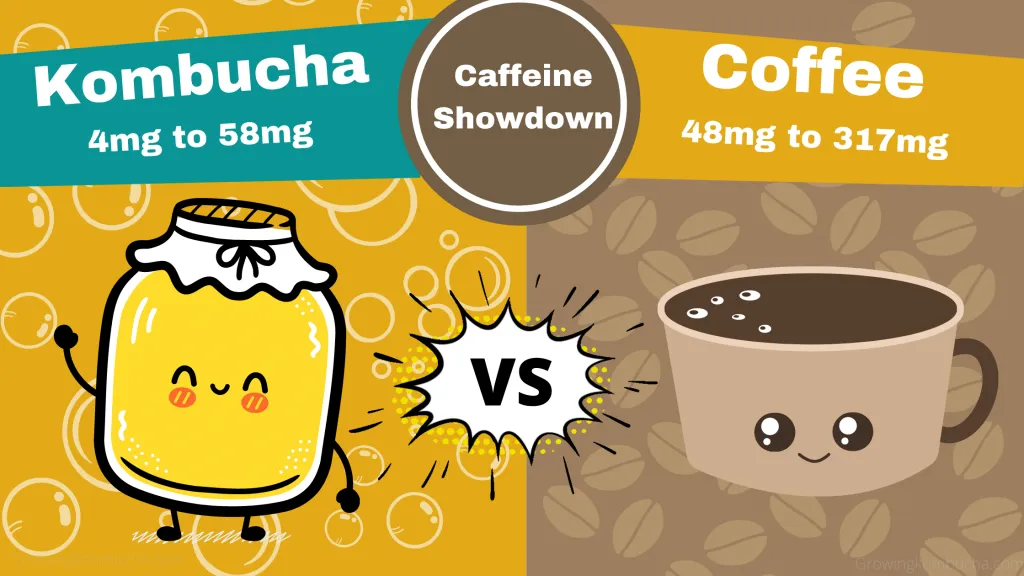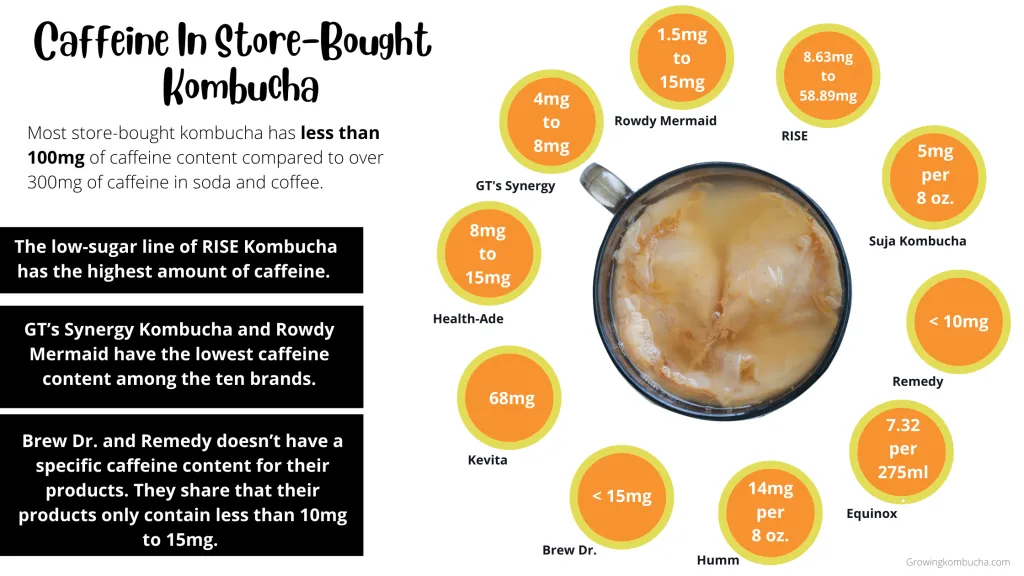Caffeine is a substance that can be a friend or foe to your health. Most people are in love with its energy-boosting effect but it also makes anxiety worse for those suffering from the condition. As kombucha infiltrates the health space, the caffeine in kombucha is one of the frequently asked questions from recovered caffeine addicts and caffeine-sensitive individuals.
In this post, we will share the amount of caffeine in kombucha and how much it differs from the caffeine in common caffeinated food and drinks like coffee, chocolate, and energy drinks. Since kombucha brands do not include caffeine content in their labels, we created a comprehensive list to serve as a buyer’s guide.
Does kombucha have caffeine & how much is it?
Kombucha is made of sugar, tea, water, and starter culture. The teas used in making kombucha are black, green, and white tea, which all contain 28mg to 47mg of caffeine. Most brewers believe that during the fermentation process, the yeast and bacteria in SCOBY feed on the caffeine and sugar and turn it into ethanol.
After the fermentation process, the caffeine left in kombucha is only one-third of its pre-fermentation values. So, if the sweet black tea contains 40mg of caffeine before the first fermentation, the caffeine content of kombucha is 13.32mg.
One brave kombucha enthusiast, Michael R. Roussin seeks to debunk the truth behind the relationship between SCOBY and caffeine. In his research, he found that the caffeine in kombucha is the same amount leached from the tea during the pre-fermentation phase.
Whether it’s true that yeast and bacteria feed on caffeine or not, it’s still a fact that there are some traces of caffeine in kombucha. The source and the reduced amount of caffeine are just the hazy part of the process and are still under an ongoing debate.
Going back to the caffeine in kombucha, you’re probably wondering if 20mg to 40mg is too much or at par with coffee. Well, it’s significantly lower than you think. Check out the comparison of caffeine in kombucha and coffee below:
Caffeine content comparison: Kombucha vs. coffee
To give you some context, the daily recommended caffeine intake is 400mg. If you love buying coffee in your local coffee shop every morning, the range that you might be consuming is roughly around 48mg to 317mg, according to a study.

As for kombucha, a 16 oz. store-bought bottle of kombucha may contain around 4mg to 58mg. If we bring in some math, your average cup of coffee contains 81% to 91% more caffeine than kombucha. If a cup of coffee doesn’t cause any jittery feeling, then your body won’t likely experience any side effects.
Effects of caffeine in kombucha on the body
Each person has a different caffeine sensitivity. A cup of Arabica brewed coffee can make one person feel energized while making the other anxious and restless. The good news is there’s a difference in the effects of caffeine in kombucha and coffee. Interesting isn’t it?
Aside from having less caffeine than coffee, the black and green tea used in kombucha both contain a relaxing substance called L-theanine. Have you ever wondered why even if it has caffeine, people often go for a cup of tea to calm down and relax? It’s because L-theanine works with caffeine to perform its mood-altering prowess.
The combination of L-theanine and caffeine in the tea added in kombucha provides the following benefits:
- Lower levels of stress hormones and cortisol.
- Lower risks of developing dementia and depression.
- Induces a sense of calm without being sleepy.
- Improves alertness and cognition.
In summary, the effect of caffeine in kombucha can give you the perfect balance of energy to get through the day and a sense of calm against the daily anxieties of life. Kombucha is also low in calories and sugar, making it a perfect healthy alternative to coffee.
What affects the caffeine levels in kombucha
If you are home brewing kombucha, it can be hard to gauge its caffeine levels. There are some factors involved that may cause varying caffeine content in homebrewed kombucha. These include:
- Length of time the tea is steeped.
- Type of tea used and how it is harvested (Peak season tea harvests contain more caffeine).
- Water temperature when the tea is steeped.
- Water and tea leaf ratio.
Kombucha offers a wide selection of flavors that you can enjoy. It can help restore the joy of enjoying some delectable but low-in-caffeine drinks for people with anxiety disorders, especially if they hate the unpleasant taste of decaffeinated drinks.
While kombucha offers an attractive set of potential health benefits, caffeine-sensitive individuals must consider taking some precautions. For a more calculated caffeine intake, it’s best to opt for store-bought kombucha that indicates the amount of caffeine on its label or the company’s website.
Caffeine in popular kombucha brands
Since caffeine is usually in the nutrition facts and labels, we did the research. We selected the top ten kombucha brands that are widely available in the market and fan favorites. Here’s what we found:

Notable insights:
- GT’s Synergy Kombucha and Rowdy Mermaid have the lowest caffeine content among the ten brands.
- Brew Dr. and Remedy doesn’t have a specific caffeine content for their products. They share that their products only contain less than 10mg to 15mg.
- The low-sugar line of RISE Kombucha has the highest amount of caffeine. Here are the caffeine levels in their kombucha variants:
- Orange & Turmeric: 10mg.
- Fresh Ginger: 37.20mg.
- Lychee & Jasmine: 10.83mg.
- Hibiscus & Rose Hips: 15.60mg
- Mint & Chlorophyll: 16.29mg
- Lemongrass 19.77:mg.
- Blueberry & Maple: 16.36mg
- Rose & Schizandra: 8.63mg.
1g Line (Low-sugar) - Raspberry & Vanilla: 43.47mg.
- Mango & Papaya: 58.89mg.
- Kiwi & Pineapple: 32.5mg.
- Watermelon & Mint: 32.91mg.
It can be heartbreaking for the caffeine-sensitive and anxious patients when the doctor said they should give up coffee for good. However, Equinox Kombucha says fret no more. They offer an espresso-flavored kombucha with 22.25mg of caffeine in a 250ml can. Miss the taste of coffee without the jittery feeling and sleepless nights? Equinox Espresso Kombucha might do the trick!
Overall, can kombucha replace coffee in your life? Definitely yes, if you’re after the energy-boosting effect of coffee. It can also help you go regularly and makes a perfect drink while hanging out with your friends.
Frequently Asked Questions (FAQs)
How much caffeine is in kombucha compared to coffee?
There’s only ⅓ of the caffeine in tea left after the fermentation process. Whereas, caffeine in store-bought kombucha is around 4mg to 58mg while a cup of coffee contains 48mg to 317mg.
Does kombucha keep you awake?
Kombucha may or may not keep you awake because everybody has a different caffeine tolerance. If a cup of coffee fails to keep you awake through an all-nighter, then kombucha will likely do the same since it contains less caffeine and also comes with traces of alcohol.
Advocates often love the calming effect of kombucha that keeps them alert and does not suffer a hangover the next day. They consider it a perfect alternative to booze.
How much caffeine is in 8 oz of kombucha?
There is around 8mg to 14 mg of caffeine in the 8-ounce bottles of Suja and Humm Kombucha. In a homebrew kombucha setup, you can estimate the caffeine content by getting the ⅓ value of caffeine in the tea that you used.
Is kombucha a stimulant?
By definition, a stimulant is a drug that increases the activity of the central nervous system. Caffeine is a naturally-occurring chemical with stimulant effects. Since kombucha contains caffeine, it is a stimulant because it increases your mental alertness but at a lower grade.
Is it OK to drink kombucha every day?
Yes, it is perfectly fine to drink kombucha every day. However, you should stick to 12 oz. per day to avoid experiencing its side effects.
Can I drink kombucha before bed?
No, kombucha contains a lot of acids that may upset your stomach as you sleep. It’s best to consume it 2 to 4 hours before bed, so your body can process it before you get off to bed. Plus, sleeping with a full bladder can disrupt your sleep.
Does GT’s kombucha have caffeine?
Yes, GT’s Synergy Kombucha contains 4mg to 8mg of caffeine. They offer one of the lowest caffeine content among the top ten kombucha brands from our survey.
What happens to caffeine in kombucha?
The caffeine in kombucha can range from 4mg to 58 mg, depending on how the tea is prepared. There is an ongoing debate about what happens to caffeine in kombucha during fermentation.
Most advocates believe that the SCOBY eats it along with sugar, while some kombucha enthusiasts think that it retains the caffeine from the tea. What we can say for sure is that caffeine is present in kombucha but it’s on low-grade levels.
Does kombucha get you high?
Though kombucha contains alcohol and caffeine, it doesn’t have an intoxicating feeling. However, it can alter your mood and help you relax due to its tea content.
Which kombucha has no caffeine?
Some brewers experiment with their brews to keep them caffeine-free like ROWDY Mermaid Kombucha’s Lions Root, Flower Grow, and Watermelon Bloom. Some use herbal teas like lemongrass tea. However, expect that it can be more expensive than your usual kombucha.
How much caffeine is in Jun kombucha?
Jun kombucha is a type of kombucha wherein the SCOBY is trained to feed on honey rather than white sugar. Since Jun kombucha still contains black or green tea, it has the same caffeine content as regular kombucha which is around 4mg to 58mg.
